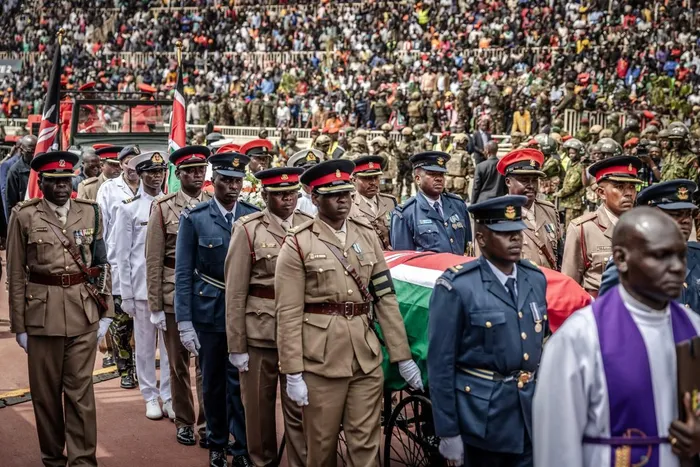Kenyans Grapples with Raila Odinga's Complex Legacy

Senior Kenya Army officials flank the coffin of Kenya’s opposition leader and former Prime Minister Raila Odinga during his State Funeral at Nyayo Stadium in Nairobi.
Image: AFP
Kim Heller
Thousands of Kenyans assembled in Nairobi’s Nyayo National Stadium, along with key African leaders, on 19 October 2025 to bid a final farewell to veteran politician and former Prime Minister of Kenya, Raila Amolo Odinga.
The passing of the 80-year-old political leader, Raila Odinga, on October 15, 2025, in Kochi, India, has evoked tears of sorrow as well as harsh criticism. Those who loved him have penned emotive tributes to Odinga, describing him as a true leader whose political vision, conviction, and contribution were instrumental in fostering democracy and unity in Kenya. His critics, on the other hand, remember him as a divisive leader who caused ethnic and political friction and did more harm than good.
For better or worse, Raila Odinga was a pivotal figure in Kenya's recent history. Like Presidents Mwai Kibaki and Uhuru Kenyatta, Odinga is an intrinsic part of the birth and growth pains of post-independent Kenya, its complex socio-economic power relations, and its quest for national unity and prosperity.
If one reflects honestly and fairly on his legacy, Raila Odinga represents both the very best and the very worst of Kenya—its abundant but unfulfilled promise and its many leadership pitfalls and ongoing challenges.
Raila Odinga was born into a political family. His father was the first Vice-President of Kenya. Odinga suffered immensely under the brutal, authoritarian regime of Daniel Arap Moi. Detained for almost nine years, he spent long stretches in solitary confinement and was imprisoned without ever being formally charged.
When he was released from prison in 1991, he emerged as a strong advocate for multiparty democracy in Kenya. Odinga spoke of the need for a stronger citizen voice in government affairs and preached equity, fairness, democracy, and constitutionalism. For disgruntled Kenyans, Odinga represented a beacon of hope. He emerged from jail as a heroic political figure.
Yet Odinga’s stature as a liberatory, people-centric political leader was somewhat tarnished by the political violence that erupted in the aftermath of the hotly contested Kenyan presidential election of 2007. Odinga had contested against the incumbent president of Kenya, Mwai Kibaki, and Odinga had lost. Accusations of an unfair electoral process swelled into a whirlwind of political turmoil, civil unrest, and ethnic conflict. In the most violent unrest in Kenya’s history, over 1,000 people were killed and hundreds of thousands displaced.
The civil unrest was finally contained when Odinga accepted a power-sharing deal. Kibaki held onto his presidential reins, while Odinga served as the country’s Prime Minister. Despite the seeming calm of a nation at the end of a devastating storm, Kenya was left battered, and the coalition was an uneasy one.
Nevertheless, Odinga made some positive strides during his tenure. He played a leading role in developing the 2010 Constitution, which set the blueprint for more equitable governance and stronger rights for citizens, especially marginalised groups.
History teaches that power expires quickly. In 2013, Odinga’s control was shaken when an alliance between William Ruto and Uhuru Kenyatta saw Kenyatta ascend to power. Yet a few years later, Odinga hit back. In the chaos of a disputed 2017 election between Odinga and Kenyatta, Odinga declared himself the “People’s President,” plunging Kenya into another crisis. Yet another historic alliance saved the day.
A power pact between Kenyatta and Odinga was solidified in the ‘Building Bridges Initiative,’ which many celebrated as a tremendous act of statesmanship. While the initiative was cast as a victory for inclusiveness, power-sharing, and national unity, a more sceptical reading was that this deal was little more than a preservation scheme for political elites.
In 2022, in another political twist in the dangerous Game of Thrones, Kenyatta endorsed Odinga as his successor over his former ally, William Ruto. Odinga achieved 48.85% of the vote. This was not enough to beat Ruto, who enchanted voters with his powerful youth empowerment campaign promises. Odinga cried foul and claimed electoral fraud. But in the end, however, he conceded defeat in the interests of Kenya’s peace and stability.
Despite Odinga’s four presidential runs, he never won the major prize he so longed for - the presidency of Kenya. Nevertheless, he persevered and will be remembered as a man of determination and resilience. In 2024, he campaigned for the role of the African Union Commission’s Chairperson.
His campaign, which focused on African sovereignty, youth development, and strengthened intra-African trade, failed to secure him this prized position. For Odinga, it was another defeat as Djibouti’s Mahamoud Ali Youssouf claimed victory.
Odinga’s legacy is contested. His supporters will always remember him as a champion of multiparty democracy and constitutional reform. His detractors will forever condemn him for his role in favouring, enabling, and entrenching elite power pacts over a more inclusive, people-centric government.
The current president of Kenya, William Ruto, paid tribute to Odinga, his former foe and ally. Ruto described Odinga as “a gallant patriot and champion of democracy whose legacy will live forever.”In his tribute, President Ramaphosa said: “The nation of Kenya and our continent have lost a patriotic and selfless leader whom I knew and worked with as a friend and brother.”
While kind tributes offer some comfort, they are inadequate relief for the people of Kenya, who continue to grapple with economic stagnation, joblessness, and poor service delivery. A post on social media by a young Kenyan said it all: “Raila fought for freedom, but we need jobs now.” Odinga was part of the old regime. It is time for the new to be born.
* Kim Heller is a political analyst and author of No White Lies: Black Politics and White Power in South Africa.
** The views expressed do not necessarily reflect the views of IOL, Independent Media or The African.